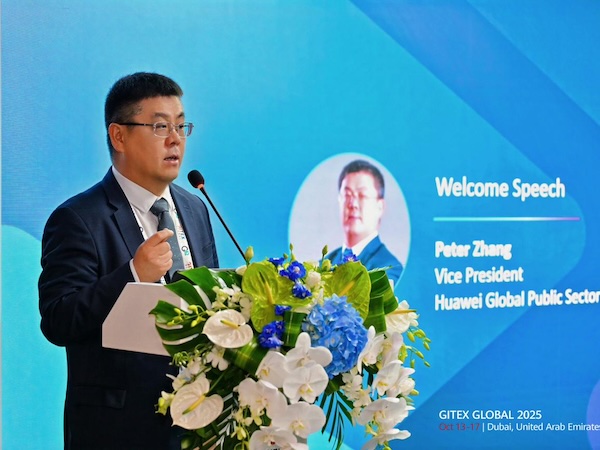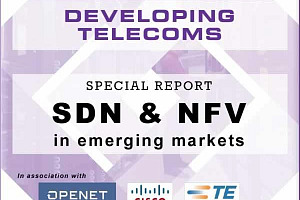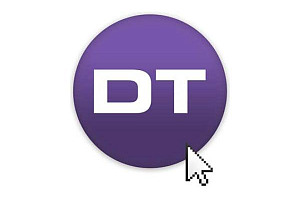Education and healthcare are the two sectors where artificial intelligence (AI) holds the greatest potential to deliver meaningful benefits for society, according to Frost & Sullivan’s Global ICT Practice Leader, Alexander Michael.
Speaking at Huawei’s Smart Education Forum at GITEX Global 2025, Michael said AI’s impact on the classroom could be transformative, allowing learning to evolve from static and standardised models into “something personalised and far more dynamic”.
The event, hosted by Huawei at Dubai World Trade Centre, brought together educators, policymakers and technology experts to discuss how digital technologies can enhance teaching quality, drive inclusivity, and optimise operations across schools and universities.
Huawei Vice President of Global Public Business, Peter Zhang (pictured, above), opened the forum by outlining how the company is applying AI in educational initiatives, such as building general knowledge platforms for primary and secondary schools, while also promoting AI literacy among students.
Zhang said nurturing future AI talent must start early, adding that Huawei’s work in education aims to create digital learning environments that build both knowledge and skills.
AI’s growing role in the classroom
Michael noted that intelligent tutoring systems are one of the most promising use cases, offering each student a personalised learning companion that would be impossible to replicate with human tutors at scale. AI tutors, he explained, can instantly assess performance, predict learning gaps, and adapt lessons in real time rather than waiting until the end of the academic year.
AI tools are also reducing the burden on teachers. Frost & Sullivan research shows that educators using automated assessment software save an average of 13.2 hours per week - time that can be reinvested in teaching and student engagement.
Despite its potential, most schools remain at an early stage of adoption. Around 89% of educational institutions are still “dabbling” in AI, while just 8% use it consistently, and only 3% have achieved full integration, according to Michael.
Among students, uptake is far higher. Eighty-six percent globally now use AI for study support - more than half weekly and a quarter daily. “In the UK, that number jumped from 66% last year to 92% today,” Michael said, adding that the rise of generative AI has accelerated the trend.
However, turning classrooms into smart, connected environments still requires strong infrastructure - from high-speed connectivity to 4K cameras, tablets, sensors, and interactive whiteboards - which remain costly for many institutions.
He pointed to Ivy Tech Community College in the United States as an example of AI’s impact. After deploying an AI system to identify students at risk of failing, 98% of those students improved their grades, marking the college’s largest reduction in failure rates in half a century.
UNESCO: AI can close education gaps
UNESCO Institute for Information Technologies in Education (UNESCO IITE) Programme Specialist Ekaterina Pushkareva (pictured, below) told the forum that AI could accelerate progress toward the UN’s Sustainable Development Goal 4, which focuses on ensuring inclusive and equitable quality education for all, particularly for marginalised groups such as low-income communities, people with disabilities, and women and girls.
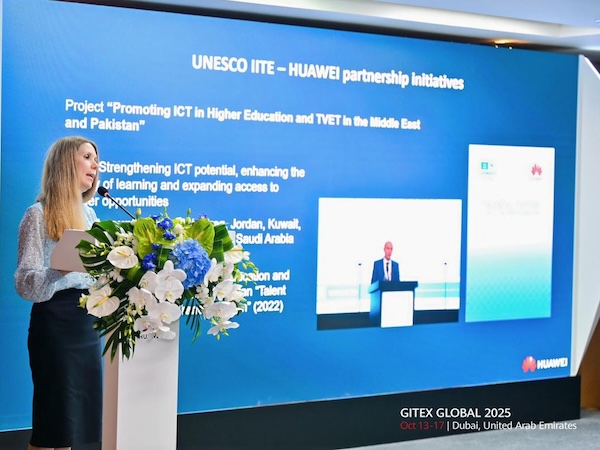
“AI is transforming higher education, opening new opportunities for more inclusive, adaptive, and future-oriented learning,” she said. “Our partnership with Huawei shows how collaboration between technology leaders and international organisations can bridge the digital divide, empower educators, and equip students with the skills they need to thrive in the digital economy.”
Pushkareva also emphasised that the partnerships between governments, private companies and international bodies is essential.
Huawei’s blueprint for intelligent education
Mehedi Hasan Limon, Vice President of Huawei Middle East and Central Asia Public Sector, presented what he called “a new blueprint for intelligent education”, centred on the company’s Smart Education 1+3 All-Scenario Solution.
The framework integrates digital training, smart classrooms, smart campuses, and scientific research into one ecosystem powered by cloud, AI, and big data. The goal, said Limon, is to create a “digital education community” that connects students, teachers, and institutions through intelligent, data-driven systems.
Huawei and UNESCO IITE also jointly launched a series of ICT Skills Development Insight Reports during the event, offering policy recommendations and scalable solutions to help schools and universities accelerate their digital transformation.
The reports outline strategies to simplify deployment, reduce technical barriers, and build inclusive learning environments supported by Huawei’s global experience and partner ecosystem.
Building the future through collaboration
Huawei Middle East and Central Asia Chief Strategy Officer, Cong Liang (pictured, below), described education as being at a “pivotal moment”, urging stakeholders to see AI not as a threat but as an enabler for better learning outcomes. “If we treat AI as an enabler, it becomes a very powerful tool and even a platform for smart education,” he said. “But if we misuse it, if we let it write the answers or the essays for us, that becomes a disaster.”
Cong said that educators and policymakers must lay the right foundations to make intelligent education sustainable. This means ensuring robust and secure infrastructure, sound governance, and digital literacy for both teachers and students. “Infrastructure, governance, and digital skills are the heart of the smart classroom,” he explained, adding that Huawei’s ongoing work with UNESCO on white papers and transformation plans aims to help national governments set clear frameworks for future-ready education systems.
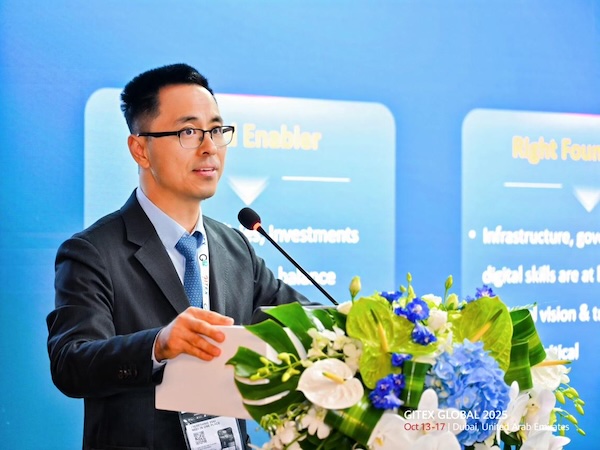
He also emphasised the importance of collaboration, calling it the “third pillar” of Huawei’s approach. “In the intelligent world, no one can succeed independently,” he said. “We have to work together - public and private sectors, across borders and across disciplines - to co-build a robust and prosperous ecosystem for intelligent education.”
Cong said the partnership with UNESCO IITE is a model for how the private sector can support global education goals through technology and shared expertise. “Huawei is committed to partnering with schools and universities to modernise teaching, drive digital campus transformation, and develop smart classroom infrastructure,” he said. “Our goal is to enhance efficiency while supporting the region’s vision for innovation, competitiveness, and the cultivation of digital talent for sustainable long-term growth.”



